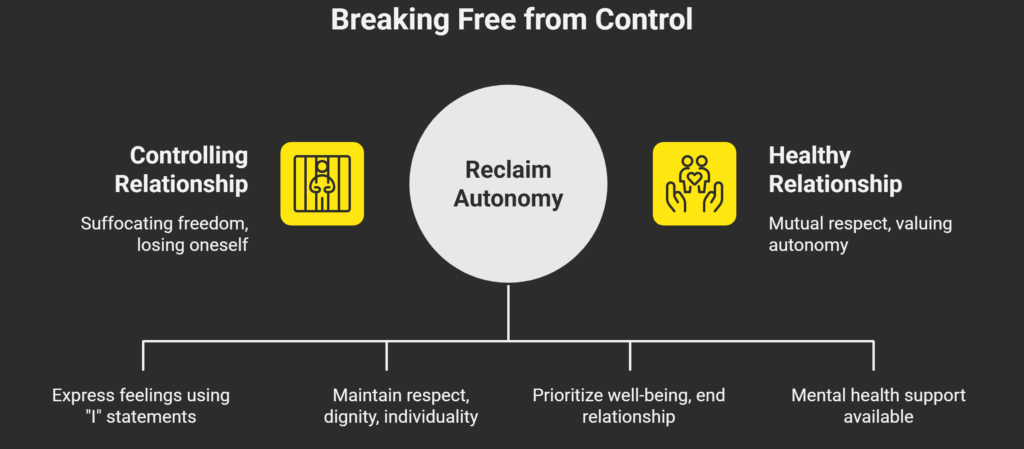Being in a relationship should bring joy, companionship, and growth. However, when a partner becomes controlling, it can lead to emotional distress and isolation. Recognizing the signs of a controlling partner is the first step towards reclaiming your independence. This guide will help you identify the red flags and empower you to take back control of your life.
Continue reading to gain insight into recognizing the signs of a controlling partner and strategies for addressing the situations and joys

Signs of a Controlling Boyfriend/Girlfriend
This can include emotional abuse, such as love bombing, where they shower you with excessive attention and affection to gain control. As the relationship progresses and the behaviour becomes more controlling, it can become toxic and potentially damaging
1. Isolating You From Your Friends and Family
- A controlling partner may start by restricting your interactions with friends and family, making it difficult for you to maintain relationships outside of the partnership.
- Over time, these restrictions can escalate, isolating you from your support network and making it challenging for you to leave the relationship.
- This can lead to feelings of helplessness and entrapment, making it even more difficult to escape the toxic dynamic
2. Severe Criticism
- Controlling partners often use severe criticism as a means of manipulation, which can be subtle at first but intensify over time. They may disguise their criticism as constructive feedback, claiming it’s intended to help us improve.
- Nevertheless, this criticism can be damaging, causing us to doubt ourselves and our abilities. As a result, we may begin to modify our behavior to appease the controlling partner, losing our sense of identity and autonomy in the process.
- Examples of severe criticism include being reproached for minor oversights, such as a tiny speck of dust in an otherwise immaculate room.
- It may also involve being questioned or blamed for not making phone calls or staying in touch while you’re away. These behaviors are all forms of criticism that can be damaging and controlling
3. Using Guilt as a Manipulation Tool
4. Violating Your Privacy
- Invading your privacy is a significant sign of a controlling partner.
- In a relationship, privacy and boundaries must be respected. If you’re living with a controlling partner, they may not respect your privacy boundaries.
- They may insist that you share everything with them, check your phone, log into your email and social media accounts, and even scrutinize your call history. If your partner is doing all these things, recognize that you’re living with a controlling partner.
5. Acquisitions and Paranoia
- If you’re constantly being blamed or mocked for even small things and your partner is suspicious of your actions, it’s essential to recognize that you’re dealing with a controlling partner.
- If your partner shows discomfort when you talk to someone of the opposite sex, whether at work or in your social circle, and accuses you of things, it’s a sign that they’re trying to control you
6. Not Allowing ME-Time
- Having me-time is essential for personal growth, relaxation, and rejuvenation.
- However, a controlling partner may not acknowledge or respect your need for alone time. Instead, they might deny you time for yourself, disrupt your solitude, or even harass you when you’re trying to have some quiet time.
- This behavior is a red flag, indicating that your partner is trying to control and manipulate you.
7. Excessive Control
- Controlling your finances
- Dictating your daily routines
- Regulating your interactions with others
- Monitoring your purchases
- Restricting your access to medical care
8. Make Decisions for You
- Normally, we all have our own opinions and preferences, whether it’s about what to wear, what to eat, or where to go.
- However, when you’re in a relationship with a controlling partner, your decisions are disregarded. They will make decisions for you and expect you to comply.
- Decide what you wear
- Choose what you eat
- Determine your social activities
- Make decisions about your health and well-being
- Expect you to follow their instructions without question
9. Overprotective
- Excessive jealousy
- Possessiveness
- Constant questioning about your activities
- Restricting your freedom
- Disregarding your opinions and interests
10. Blame Games
- When you try to discuss your partner’s controlling behavior with them, they won’t take responsibility for their actions. Instead, they might misinterpret your conversation with a friend and accuse you of being at fault.
- Even if you try to explain the situation and clear up any misconceptions, your controlling partner will refuse to acknowledge their role in the issue. They will turn the tables and make you feel like you’re the one who’s wrong.
11. Gaslighting
- Denying previous agreements or conversations
- Blaming you for their own mistakes
- Minimizing or trivializing your feelings
- Making you feel overly sensitive or paranoid
- Pretending to be joking or teasing when they’ve actually hurt or offended you
- Gaslighting can make you feel like you’re the one with the problem, leading to self-doubt, anxiety, and a loss of confidence. Remember, a healthy relationship values honesty, respect, and open communication.
- In a controlling relationship, the partner will often use blame-shifting tactics to avoid accountability and maintain power over you. This can lead to feelings of guilt, shame, and confusion, making it difficult for you to recognize the abuse and take action to protect yourself
How to Deal with a Controlling Partner

- Physical control (e.g, physical abuse)
- Emotional control (e.g., gaslighting)
- Financial control (e.g., restricting access to money, monitoring spending)
- Social control (e.g., limiting social interactions, isolating you from friends and family)
1. Effective Communication
Once you’ve ensured your safety, prepare to have a conversation with your partner. Be aware that you’ll be discussing their controlling behavior.
Choose the right time and approach the conversation calmly. Address the specific controlling behavior and use “I” statements to express your feelings and experiences. Instead of accusing your partner of being controlling, describe how their behavior has affected you.
For example:
- “I feel suffocated when you constantly check in on me” instead of “You’re always checking in on me because you’re controlling”
- “I feel hurt when you dismiss my opinions” instead of “You always dismiss my opinions because you don’t care about my feelings”
2. Setting Boundaries
Establishing boundaries is crucial for maintaining a healthy relationship. Boundaries help maintain mutual respect, dignity, and individuality, while preventing manipulation and abusive behaviors.
Remember, you deserve to be in a relationship where your partner respects and values your autonomy, individuality, and happiness. Don’t be afraid to take control of your life and make the difficult decision to walk away if necessary
When setting boundaries:
3. Know When to Walk Away
- If you’re in a controlling relationship that’s suffocating your freedom, interests, and values, it may be time to reevaluate the relationship.
- If you feel like you’re losing yourself in the process, it’s essential to prioritize your well-being and consider ending the relationship.
4. Seek Professional Support
- If you’re struggling to leave a controlling relationship or want to make the relationship healthier, consider seeking professional mental health support.
- Oppam therapists are always available for your service
- Searching for affordable relationship counselling? Oppam is here to help.

How to Deal with a Controlling Partner: Recognizing Red Flags
- They constantly question your actions and decisions
- They try to isolate you from friends and family
- They are overly possessive or jealous
- They try to control your finances or daily activities
If you notice any of these signs, it’s essential to take a step back and reevaluate the relationship. Remember, a healthy relationship is built on mutual respect, trust, and communication.
Recognizing Examples in Media :In the movie ‘Uyare‘, Asif Ali’s character is a prime example of a manipulative and controlling partner. His behavior is a clear indication of a red flag, and it’s essential to recognize such signs in real-life relationships to avoid emotional harm and maintain healthy boundaries
Trust Your Instincts : If your partner constantly criticizes you, displays jealousy, and tries to control every aspect of your life, making you feel dominated and powerless, then you’re likely in a controlling relationship. Alternatively, your partner may be exhibiting red flag behavior.
How to Deal with Emotional Abuse in a Controlling Relationship
Emotional abuse often involves guilt-tripping, blackmailing, and manipulation — all clear red flags in a relationship. Recognizing these signs is essential for acknowledging and addressing emotional, physical, and verbal abuse.
Signs of Emotional Abuse Include:
- Constant criticism and belittling
- Emotional manipulation and guilt tripping
- Isolation from friends and family
- Threats and intimidation
- Gaslighting and denial of reality
If you recognize any of these signs, it’s important to prioritize your well-being. Seeking help from trusted friends, family, or a professional counselor can provide the support and guidance you need. Remember, a healthy relationship is built on mutual respect, trust, and open communication.
Rebuilding Your Independence After Leaving a Controlling Relationship
The first step to regaining independence is acknowledging that you’re in a toxic relationship and recognizing that your partner is controlling.
- Reconnect with friends and family
- Engage in activities and hobbies outside of the relationship
- Set boundaries and prioritize self-care
- Seek support from a therapist or counsellor
- Create a safety plan for leaving the relationship
Grief and Forgiveness
After a breakup, it’s normal to experience a mix of emotions. Grief is a natural response to loss, and acknowledging it is an essential part of the healing process.
Grief can manifest in various ways, including emotional, physical, and psychological symptoms. Recognizing that grief is a gradual process is important. It can’t be rushed or controlled.
Seeking therapy can provide effective coping strategies. Platforms like Oppam offer accessible support with qualified therapists who can help you navigate your emotions.
Journaling can also be a therapeutic tool for processing feelings. Writing down your thoughts can bring clarity and provide relief.
Forgiveness is another critical part of healing. It doesn’t mean excusing the hurtful behavior but rather releasing the negative emotions tied to it. Forgiving allows you to reclaim emotional freedom and move forward.
Healing After a Toxic Relationship: Rebuilding Self-Esteem and Practicing Mindfulness
Recovery from a toxic relationship takes time and patience. It’s essential to prioritize self-care and focus on rebuilding your self-esteem and confidence. Engaging in activities that bring you joy and reconnecting with yourself can significantly aid your healing journey. Seeking mental health support is also an important step.

If you’re looking for professional support, affordable relationship counselling is a great option. Platforms like Oppam offer convenient and accessible online therapy with experienced counsellors.
Rebuilding Self-Esteem
After a breakup, especially with a controlling partner, it’s common to feel emotionally shattered. To rebuild your self-esteem, it’s essential to identify your challenges and set achievable goals.
Mindfulness
Practice Mindfulness: Mindfulness involves focusing your awareness on the present moment. By staying mindful, you can reduce stress and minimize distractions.
Engage in Mindfulness Activities: Practices like meditation and deep breathing can promote a sense of calm and heightened self-awareness. To explore these further, consider booking an online therapy session with Oppam.
Prioritize Self-Care: Maintaining good mental health requires regular exercise, balanced nutrition, and adequate sleep.
Incorporate Mindfulness Daily: Establishing a mindfulness routine can improve your resilience and help you navigate life’s challenges with greater clarity.
Set Goals and Celebrate Progress: Make a list of goals, work towards achieving them, and celebrate small victories along the way.
Build a Supportive Network: Surround yourself with people who offer encouragement and support. Sharing your feelings can be a powerful step towards healing.
Positive Affirmations
Boost Your Self-Worth: Positive affirmations can be powerful tools for cultivating a healthy self-image. If your self-worth has been affected by a controlling relationship, affirmations can help rebuild your confidence.
Practice Daily Affirmations: Repeating statements like “I am worthy,” “I am confident,” and “I trust my judgment” can foster a more positive outlook on life.
Practicing Empathy and Communication Skills
Enhance Your Relationships: Developing empathy and communication skills can strengthen your connections with others and enrich your overall quality of life.
Practice Active Listening and Understanding: By empathizing with others, you can build more meaningful and fulfilling relationships.
Express Yourself Clearly: Effective communication reduces conflicts and misunderstandings, helping you build healthier interactions.
Developing Healthy Relationships
Healthy relationships can:
- Provide emotional support
- Encourage personal growth
- Offer a sense of belonging
- Improving mental health
Seek Professional Help
If you are struggling to regain your self-esteem after a toxic relationship, consider seeking professional support.
Don’t hesitate to reach out. Rebuilding your self-esteem takes time, patience, and guidance. A mental health professional can provide the assistance you need to heal and move forward.
Need help navigating your concerns? Book an online relationship counselling session with Oppam.
Leaving a Toxic Relationship: Building a Support System and Reclaiming Your Life
Recognizing that you’re in a toxic relationship and that your partner is controlling can be a difficult and painful process. It takes time to accept the reality of your situation. Initially, you may experience denial, which is a normal stage in the process. However, as you move forward, it’s essential to consider the benefits of leaving the relationship and becoming free.
Benefits of Breaking Free:
- Regaining control over your life
- Escaping emotional manipulation
- Rediscovering your self-worth and confidence
- Building a healthier and happier future
Building a Support System
- Surround Yourself with Supportive People: Connect with individuals who offer emotional support and a listening ear—friends, family members, or a trusted therapist.
- Open Communication: Sharing your emotions with your support system can help you process feelings and navigate the challenges that come with ending a relationship. You may experience a range of emotions, including sadness, grief, anger, and anxiety.
What a Support System Can Offer:
- Emotional support and validation
- Practical guidance and advice
- A fresh perspective on your relationship
- Assistance throughout your healing journey
Allow Yourself Time to Heal
- Be Patient with Yourself: Healing from a toxic relationship takes time. Don’t rush the process—allow yourself the space to grieve and process your emotions.
- Embrace the Journey: Healing is a journey that requires patience and self-compassion. Giving yourself this time will help you emerge stronger, wiser, and more resilient.
Set Goals for Your Future
Setting clear goals can help you navigate your future and establish a sense of purpose. Define objectives related to your career, financial independence, and personal growth. Whether short-term or long-term, having a clear direction keeps you focused and motivated.
Seeking professional help
- Why Professional Help Matters: A toxic relationship can leave you emotionally drained and unsure of how to move forward. Seeking professional help is a critical step toward recovery.
- Safe and Non-Judgmental Space: A therapist can provide a safe environment to process emotions, rebuild your confidence, and develop a plan for healing.
- Expert Help from Oppam: Oppam offers specialized therapists to support emotional abuse recovery and therapy for toxic relationships.
If you are struggling with control in your relationship, OPPAM’S expert therapists can help…..
Are you confused about how to handle your issues?
Book a confidential session today!




